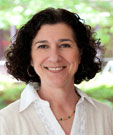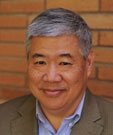External Advisory Committee
The External Advisory Committee is charged with annual reviews and appraisals of the Center's research and training operations, participant burden, and opportunities for future collaboration with other Centers. This group is constituted by leading researchers in the areas of sedentary behavior, physical activity, cardiovascular disease epidemiology and health among individuals of Hispanic/Latino Heritage.
EAC Members
Martha Daviglus, M.D., Ph.D., University of Illinois at Chicago
Dr. Daviglus is the Edmond Foley Professor of Medicine, Director of the Institute for Minority Health Research, and Associate Vice Chancellor for Research at the University of Illinois at Chicago (UIC). She is a bilingual and bicultural physician/ epidemiologist of Hispanic origin (Bolivian) and the founding Director of the UIC Institute for Minority Health Research (IMHR), which was established in 2012 as a campus-wide unit committed to promoting interdisciplinary research, training, policy development, and community partnerships to improve the health of vulnerable minority populations. Prior to joining UIC, Dr. Daviglus was a Professor of Preventive Medicine and Medicine at the Northwestern University Feinberg School of Medicine, where she has been a faculty member since 1993 (Adjunct Professor since 2012). Dr. Daviglus' research activities have concentrated on the epidemiology and prevention of cardiovascular diseases and related chronic conditions, minority health, and health disparities. She has been involved in investigating associations of traditional cardiovascular and nutritional risk factors with long-term cardiovascular morbidity and mortality in middle-aged and older men and women, and has examined the benefits of favorable cardiovascular risk profile (low risk) earlier in life on health care costs and health-related quality of life in older age. She has received numerous grants and awards including the Established Investigator Award from the American Heart Association (AHA) and has had continuous funding from the National Institutes of Health (NIH) since 1995. Currently, Dr. Daviglus is the principal investigator (PI) or co-PI on a number of NIH-sponsored longitudinal studies including the Hispanic Community Health Study/ Study of Latinos (HCHS/SOL) Chicago Field Center (the largest longitudinal study on Hispanics/Latinos to date) and the Illinois Precision Medicine Consortium (one of the sites that will help to enroll participants in a national research effort). She also serves as PI for the UIC Cohort of Patients, Family, and Friends. Furthermore, she is the Director of an NHLBI T32 Pre- and Post-doctoral Research Training Program on Cardiovascular Epidemiology and Related Chronic Diseases in Minority Populations at UIC. Dr. Daviglus is actively involved with the NIH and AHA. She serves on NIH research peer-review committees and study sections and is a spokesperson for AHA.
 David Dunstan, Ph.D., Baker IDI Heart and Diabetes Institute
David Dunstan, Ph.D., Baker IDI Heart and Diabetes Institute
David is Head of the Physical Activity laboratory at the Baker Heart and Diabetes Institute in Melbourne and is an NHMRC Senior Research Fellow and Baker Fellow. He also holds the position of Professor within the Centre for Exercise and Nutrition at the Mary MacKillop Institute for Health Research, Australian Catholic University. His research focuses on the role of physical activity and sedentary behaviour in the prevention and management of chronic diseases. He has published over 200 peer reviewed papers, including publications in high impact journals such as Circulation, Diabetes Care and Diabetologia. In 2016 he was invited to be a co-author on the American Diabetes Association's position statement on Physical Activity/Exercise and Diabetes. David is currently the Chair of the National Physical Activity Committee of the Heart Foundation. Over the past 15 years he has extensive media interest in his research including interviews with ABC Catalyst, 60 Minutes Australia, National Public Radio, Wall Street Journal, CNN, the New York Times and the LA Times.

James Lash, M.D., University of Illinois at Chicago
Dr. James Lash is Professor of Medicine in the Division of Nephrology at the University of Illinois at Chicago (UIC) College of Medicine. His research focuses on the epidemiology of chronic kidney disease and interventional trials in the treatment of kidney disease, particularly in racial and ethnic minority populations in the United States. He has particular expertise in evaluating the impact of patient-centered factor and lifestyle on the development and progression of kidney disease. His clinical practice focuses on the treatment of kidney disease and hypertension. Lash is the UIC Principal Investigator on the National Institute of Diabetes and Digestive and Kidney Diseases-sponsored Chronic Renal Insufficiency Cohort (CRIC) and the Hispanic CRIC Studies. These studies investigate risk factors for the progression of chronic kidney disease and cardiovascular disease in people with chronic kidney disease. He is also the Principal Investigator for the Forgarty International Center-sponsored Mexico City CRIC Study, and a Midcareer Investigator Award in Patient-Oriented Research (K24) which is focused on providing mentorship and training for new physician-scientists in the area of health disparities in chronic kidney disease.
NCBI Bibliography
 Jill Mesirov, Ph.D., University of California, San Diego
Jill Mesirov, Ph.D., University of California, San Diego
Jill Mesirov is associate vice chancellor for computational health sciences and professor of medicine UC San Diego School of Medicine. As associate vice chancellor, Mesirov is responsible for the overarching strategy for computational health sciences and research computing at UC San Diego School of Medicine. She is a member of the UCSD Moores Cancer Center, where she serves as co-lead for the cancer genomes and networks research program.
Mesirov's research focuses on the application of machine-learning methods to functional genomics data in cancer. Her lab analyzes molecular data to determine the underlying biological mechanisms of specific tumor subtypes, to stratify patients according to their relative risk of relapse, and to identify possible new drug targets. In addition, Mesirov is committed to the development of practical, accessible software tools to bring the methods developed in her lab to the general biomedical research community. These tools are used by hundreds of thousands of investigators worldwide.
Before moving to UCSD in 2015, Mesirov served as associate director and chief informatics officer at the Broad Institute of MIT and Harvard, formerly the Whitehead Institute/MIT Center for Genome Research, where she directed the Computational Biology and Bioinformatics Program. She previously served as manager of computational biology and bioinformatics in the Healthcare/Pharmaceutical Solutions Organization, director of research at Thinking Machines Corporation and has also held positions in the mathematics department at the University of California at Berkeley and served as associate executive director of the American Mathematical Society.
Mesirov, a former president of the Association for Women in Mathematics, is a fellow of the American Association for the Advancement of Science (AAAS), the American Mathematical Society (AMS), and the International Society for Computational Biology (ISCB).
Mesirov received her B.A. in mathematics from the University of Pennsylvania. She earned her M.A. and Ph.D. in mathematics from Brandeis University.
 Neville Owen, Ph.D., Baker IDI Heart and Diabetes Institute
Neville Owen, Ph.D., Baker IDI Heart and Diabetes Institute
Neville is a National Health and Medical Research Council of Australia Senior Principal Research Fellow, Head of the Behavioural Epidemiology Laboratory at the Baker Institute and Distinguished Professor in Health Sciences at Swinburne University of Technology in Melbourne, Australia. His research deals with preventing type 2 diabetes, cardiovascular disease and cancer, through understanding and influencing physical inactivity and sedentary behavior (too little exercise and too much sitting). His program includes studies on behavioural measurement, epidemiological and experimental analyses of the health consequences of sedentary behaviors, and identifying new opportunities for disease prevention through environmental and policy initiatives. He has published some 500 peer-reviewed papers and book chapters and has co-edited a new book: Sedentary Behavior and Health (Human Kinetics, 2017). Owen's research findings contribute broadly to improving population health and healthy ageing through informing innovations in transport, urban planning, workplace policy, and health care.

John Y-J. Shyy, M.D., University of California, San Diego
Dr. John Y-J. Shyy is Professor of Medicine in the Division of Cardiology, Department of Medicine at University of California, San Diego (UCSD). He was trained as a vascular biologist and has been working on the effects of hemodynamic forces, in particular, shear stress on the endothelium with emphasis on the etiology of atherosclerosis. His lab has established a wide range of the experimental approaches encompassing molecular, cellular, and bioengineering techniques coupled with multiple knockout and transgenic animal models to study endothelial response to various physiological and pathophysiological flows. Recently, Dr. Shyy and his colleagues launched new projects to investigate molecular mechanisms by which systemic inflammatory insults such as those involved in rheumatoid arthritis and Kawasaki Disease (KD) affect endothelial innate immunity in disease. These new projects heavily rely on the newly developed genomics, proteomics, bioinformatics tools, and next generation sequencing (NGS). Closely related to cardiovascular diseases in general, Dr. Shyy's research is also translationally relevant.
